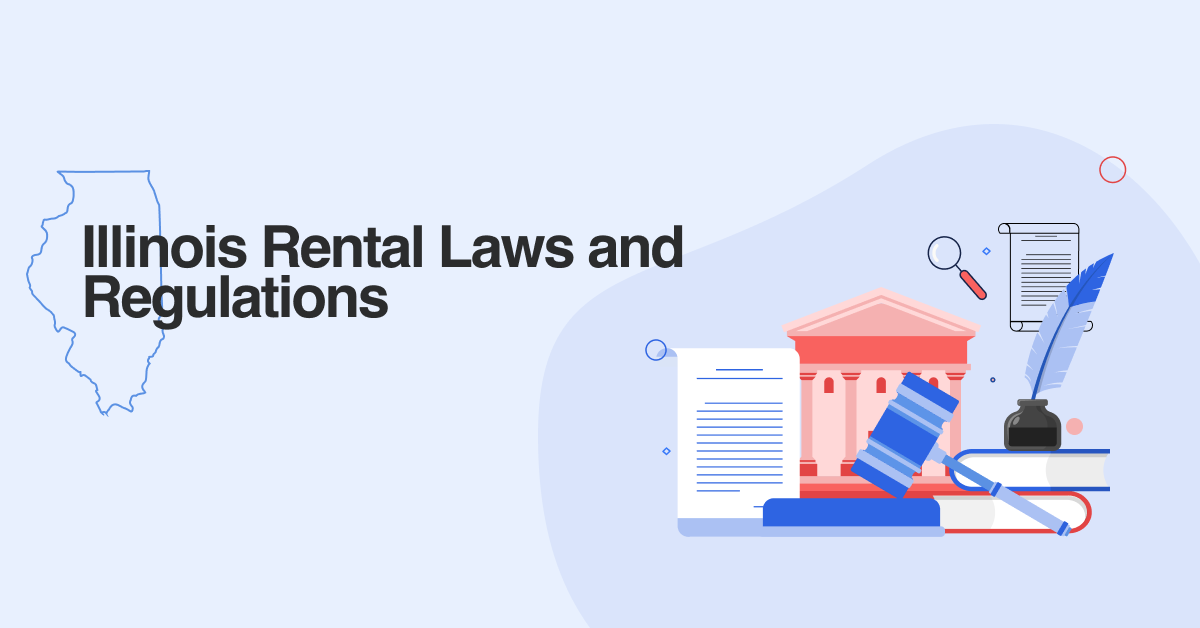
Disclaimer: This article doesn’t constitute legal advice, and landlords should not substitute this information for professional legal advice.
Whether you manage a single unit or rent out multiple properties, you must know Illinois’ rental laws and regulations. As a landlord, you want to maximize your investment while ensuring that renters have a reasonable place to live. Learn about everything from lease agreements and security deposits to notice of entry and required disclosures in this guide to Illinois rental laws.
A guide to Illinois rental laws and regulations
- Leases, rent, and fees
- Security deposits and deposit management in Illinois
- Notices and entry regulations
- Illinois utility laws
- Illinois pet laws
- Required disclosures
- Eviction laws in Illinois
- Illinois business licenses
- Illinois court information
- Additional resources for Illinois landlords
- FAQs about rental laws in Illinois
Leases, rent, and fees in Illinois
When renting out property in Illinois, you must have a written rental agreement for leases longer than a year. Legally, you can use a verbal agreement for shorter leases. However, it’s usually in landlords’ best interest to get a lease agreement in writing.
What to include in an Illinois lease
- Date that rent is due
- Late payments and fees
- If there’s a grace period offered
- Monthly payment amount
- Where to pay rent
- Payment forms accepted
- Any warnings for rent increase
Late fees
You don’t have to provide a grace period for late payments, but you should write it into the lease agreement if you do. If renters pay even a day late, you can legally charge a late fee as long as you state it in the lease agreement.
Adjusting rent prices in Illinois
If you intend to raise the rent for your units, state law requires you to inform renters well ahead of time.
- Month-to-month leases get 30 days’ notice.
- Week-to-week leases get seven days’ notice.
Keep in mind that you can increase the rent only for week-to-week leases, month-to-month leases, or longer leases due to expire. Illinois law prevents landlords from increasing rent in the middle of a lease. In addition, you can’t increase rent for discriminatory or retaliatory purposes.
There are no statewide or local rent control laws in Illinois.
When you own rental property, you can terminate existing leases at any time. You don’t have to provide a reason for ending the lease. However, you have to inform month-to-month renters at least 30 days in advance and annual renters at least 60 days in advance.
Security deposits and deposit management in Illinois
Illinois law doesn’t require you to charge a security deposit, but most landlords require them as protection against damages and repairs.
Security deposit limits in Illinois
Although many landlords opt to charge a security deposit that equals one month’s rent, state law doesn’t set limits on the amount you can charge.
Holding security deposits
When you hold security deposits for six months or longer and your building has at least 25 units, you must pay interest on any deposits in Illinois. State law requires you to keep deposits in separate accounts, which means you can’t commingle them with other assets.
Interest regulations
As an Illinois landlord, you have two options for handling interest payments:
- Pay the interest directly to the renter.
- Give the renter an equivalent credit on rental payments every 12 months.
Retaining part of the deposit
In some cases, you may have to withhold part or all of a security deposit. In Illinois, landlords may withhold all or part of the amount for only two reasons:
- Unpaid rent
- Damage beyond standard wear and tear
If you withhold the security deposit, you have to give renters an itemized list of relevant costs. Illinois law requires you to provide this list within 30 days after the move-out date. If you make repairs, you must do so within 30 days to include receipts with your itemized list. If you miss the 30-day deadline, you’re legally obligated to return the full security deposit to renters by the 45-day deadline.
Returning security deposits
After renters move out, you have to return their security deposit in a timely manner. In most cases, Illinois law requires landlords to return security deposits within 45 days after the move-out date. If the state law regarding security deposit interest applies to your situation, you also have to pay the interest when returning the security deposit.
Notices and entry regulations in Illinois
State law requires you to give at least 24 hours’ notice. Even with advanced notice, you’re limited to entering occupied units during reasonable hours or on weekdays between 8 a.m. and 6 p.m.
In the event of an emergency, Illinois law waives any notice of entry requirements. Emergencies usually apply to utility repairs and water leaks, or other issues that could cause health or safety issues.
Illinois utility laws
In many cases, the units you own will have separate gas or electricity meters, and renters will receive their utility bills from the provider. If you have a single meter for an entire building or require renters to pay a portion of the utilities for a common space, you have to share information in advance. These essential pieces of legislation affect how you handle utilities for rental units:
- Tenant Utility Payment Disclosure Act states that you have to clarify how to calculate what each renter owes from a master meter. If the renter requests, you have to provide a copy of the total bill.
- Illinois Rental Property Utility Service Act states that you have to specify if you charge renters for a share of utilities in common spaces. If you neglect to pay the utility bill for your property, renters can deduct the amount from their rent payment to you.
You cannot shut off utilities in occupied units. To evict renters, you need to file a notice.
Illinois pet laws
Illinois doesn’t have pet laws for rental properties. That means you can decide whether you want to allow pets to reside in your units. If you permit pets, you can set limits on the size or type of pets you allow.
Federal law requires landlords to allow service animals unless they would cause a substantial burden or additional cost.
Required disclosures in Illinois
Before your renters move into your property, Illinois law requires you to provide several disclosures. In most cases, you have to disclose these details in writing, such as in your lease agreement:
Foreclosure notice
If your property is currently in foreclosure, you must inform prospective renters before signing a lease agreement.
Lead-based paint
Federal law requires landlords to inform renters of the possibility of lead-based paint in buildings built before 1978. Landlords must give renters forms and pamphlets that explain the dangers of this type of paint. If you test your property for lead, you also have to provide copies of the results to renters.
Lock changes
Before a new renter moves into a unit, you must change the locks and confirm in writing that you’ve completed this task.
Property owner identity
When you own property in Illinois, you must disclose your identity to renters, even if you use a management company to handle tasks for you.
Radon concerns
Illinois law doesn’t require you to test for radon. If you conduct a test that generates a positive result, you have to share the findings with potential renters. This requirement applies only to units on the first or second floors of the building.
Utility payments
If you require renters to pay a portion of a larger utility bill for the property, you have to disclose the situation in advance. You must tell renters how you’ll calculate utility payments, and you have to confirm that the amount you collect for these payments won’t exceed the total bill.
Eviction laws in Illinois
When you own property, you want to find good renters who care for their homes and pay on time. If your renters violate any part of a lease in Illinois, you can evict them relatively quickly.
- Five days: The number of days you have to wait before pursuing eviction for nonpayment.
- 10 Days: The number of days you have to wait before starting the eviction process for any other lease violation.
You have to file an eviction with your county court. If your renters refuse to vacate the property, you have the right to file a lawsuit against them and move the eviction process forward.
Illinois business licenses
Illinois law doesn’t require landlords to have business licenses to rent out a property. However, your city or county may have stricter regulations. Check with your local licensing bureau to confirm requirements before signing a lease agreement.
Illinois court information
If renters dispute your decision to withhold all or part of their security deposit, they may take you to court. If renters don’t pay rent and evict them, you can take them to court.
In Illinois, you can use small claims court to dispute amounts up to $10,000. For more information about filing these claims in Illinois, follow these links:
- Illinois Small Claims Court
- Cook County Small Claims Court
- Illinois Courts
- Illinois State Bar Association
Additional resources for Illinois landlords
Many Illinois landlord-tenant laws cover rental agreements throughout the state. However, some cities and counties have regulations that overrule state laws. No matter where you own property in Illinois, you can use these links to stay up to date on rental regulations:
- Illinois Landlord and Tenant Rights and Laws
- Illinois Compiled Statutes
- Housing and Urban Development – Illinois
Now that you understand the rental laws in Illinois, renting out your property can be as easy as signing up with Zumper. Discover how Zumper helps Illinois landlords find renters, screen applicants, and collect rent on one simple platform.
FAQs about rental laws in Illinois
Is Illinois a landlord- or renter-friendly state?
Renter-friendly.
Does Illinois require a written lease agreement?
Yes, depending on the length of the lease.
Does Illinois have security deposit regulations?
No. Illinois neither requires a security deposit nor sets limits on the security deposit landlords can charge.
Are landlords required to provide receipts for rent payments or deposits?
Sometimes. If you wish to have a receipt, you should ask for one.
Does Illinois place limits on late fees for rent payments?
No. There are no limits on late fees.
Does Illinois have pet laws for renters?
No. It’s up to the landlord whether to allow pets.
Do Illinois landlords have to provide notice before entry?
Yes, aside from emergencies.
Now that you understand the rental laws in Illinois, renting out your property can be as easy as signing up with Zumper. Discover how Zumper helps Illinois landlords find renters, screen applicants, and collect rent on one simple platform.



